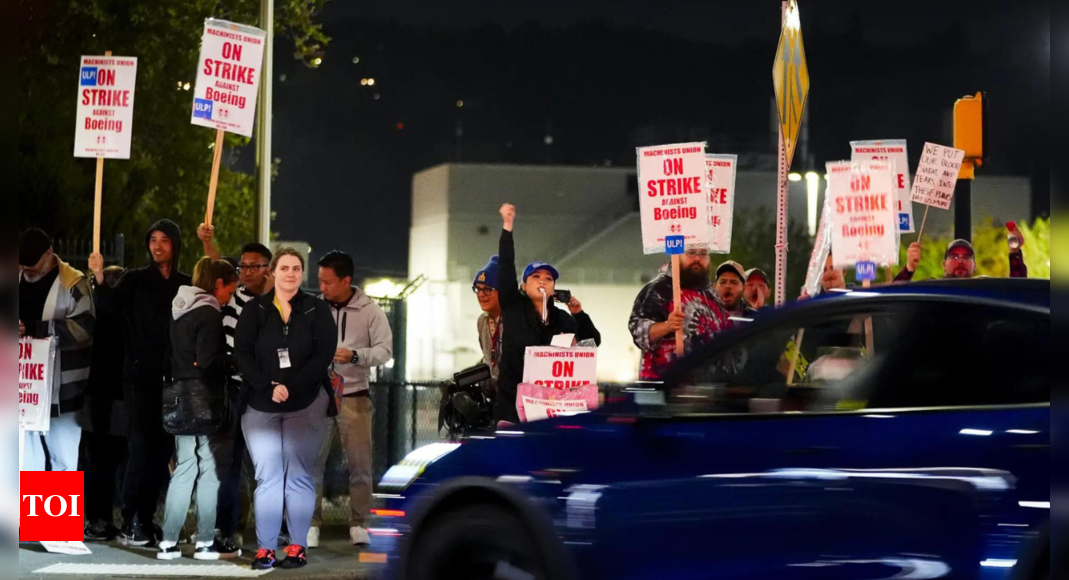
Boeing factory workers in the United States voted on Thursday to go on strike, rejecting a contract offer from the aviation company.
The workers, who are represented by the International Association of Machinists and Aerospace Workers District 751, expressed dissatisfaction with the proposed deal. The vote to reject the contract was 94.6 percent, and the vote to strike was 96 percent, according to union president Jon Holden.
The strike will affect two major plane assembly plants in the Puget Sound region and involve about 33,000 workers.Holden said, “Our members spoke loud and clear tonight. We strike at midnight.”
Boeing indicated its willingness to resume negotiations despite the vote outcome. The company said in a statement, “We remain committed to resetting our relationship with our employees and the union, and we are ready to get back to the table to reach a new agreement.”
Under the leadership of new CEO Kelly Ortberg, Boeing had offered a 25-percent wage increase over four years and a commitment to invest in the Puget Sound area. However, workers were dissatisfied, stating that the wage hike was not as generous as portrayed, and the proposed agreement eliminated an annual bonus.
The workers had sought a 40 percent wage increase. Critics argued that the proposed 25 percent increase was misleading because it did not account for the loss of the annual bonus. Other issues included the absence of a restored pension and a perceived lack of firm commitments on future projects in the Seattle region.
Paul Janousek, an electrician in Everett, highlighted the dissatisfaction, saying, “They’re talking about a 25 percent increase and it’s not.” He estimated his raise at only about nine percent after the removal of the annual bonus.
Some workers also expressed frustration over the compensation received by former CEOs Dennis Muilenburg and Dave Calhoun during challenging times for the company. Joe Philbin, a structural mechanic, noted the long-term benefits of striking. “Striking isn’t ideal, but it’s for the best for your long-term well-being,” he said.
The International Association of Machinists and Aerospace Workers has a history of strikes, with the most recent one occurring in 2008. Holden initially supported the deal as the best achievable without a strike but acknowledged the power of the union members in making the final decision.
Richard Aboulafia, managing director of AeroDynamic Advisory, suggested that a lengthy strike could impact Boeing’s recovery efforts. Nonetheless, a recent strike at Boeing supplier Spirit AeroSystems lasted less than two weeks.
Boeing has faced scrutiny following a January incident involving a Boeing 737 MAX plane. Holden expressed hope for renewed negotiations, stating that the vote “sends a strong message that our members deserve better.”
The workers, who are represented by the International Association of Machinists and Aerospace Workers District 751, expressed dissatisfaction with the proposed deal. The vote to reject the contract was 94.6 percent, and the vote to strike was 96 percent, according to union president Jon Holden.
The strike will affect two major plane assembly plants in the Puget Sound region and involve about 33,000 workers.Holden said, “Our members spoke loud and clear tonight. We strike at midnight.”
Boeing indicated its willingness to resume negotiations despite the vote outcome. The company said in a statement, “We remain committed to resetting our relationship with our employees and the union, and we are ready to get back to the table to reach a new agreement.”
Under the leadership of new CEO Kelly Ortberg, Boeing had offered a 25-percent wage increase over four years and a commitment to invest in the Puget Sound area. However, workers were dissatisfied, stating that the wage hike was not as generous as portrayed, and the proposed agreement eliminated an annual bonus.
The workers had sought a 40 percent wage increase. Critics argued that the proposed 25 percent increase was misleading because it did not account for the loss of the annual bonus. Other issues included the absence of a restored pension and a perceived lack of firm commitments on future projects in the Seattle region.
Paul Janousek, an electrician in Everett, highlighted the dissatisfaction, saying, “They’re talking about a 25 percent increase and it’s not.” He estimated his raise at only about nine percent after the removal of the annual bonus.
Some workers also expressed frustration over the compensation received by former CEOs Dennis Muilenburg and Dave Calhoun during challenging times for the company. Joe Philbin, a structural mechanic, noted the long-term benefits of striking. “Striking isn’t ideal, but it’s for the best for your long-term well-being,” he said.
The International Association of Machinists and Aerospace Workers has a history of strikes, with the most recent one occurring in 2008. Holden initially supported the deal as the best achievable without a strike but acknowledged the power of the union members in making the final decision.
Richard Aboulafia, managing director of AeroDynamic Advisory, suggested that a lengthy strike could impact Boeing’s recovery efforts. Nonetheless, a recent strike at Boeing supplier Spirit AeroSystems lasted less than two weeks.
Boeing has faced scrutiny following a January incident involving a Boeing 737 MAX plane. Holden expressed hope for renewed negotiations, stating that the vote “sends a strong message that our members deserve better.”









